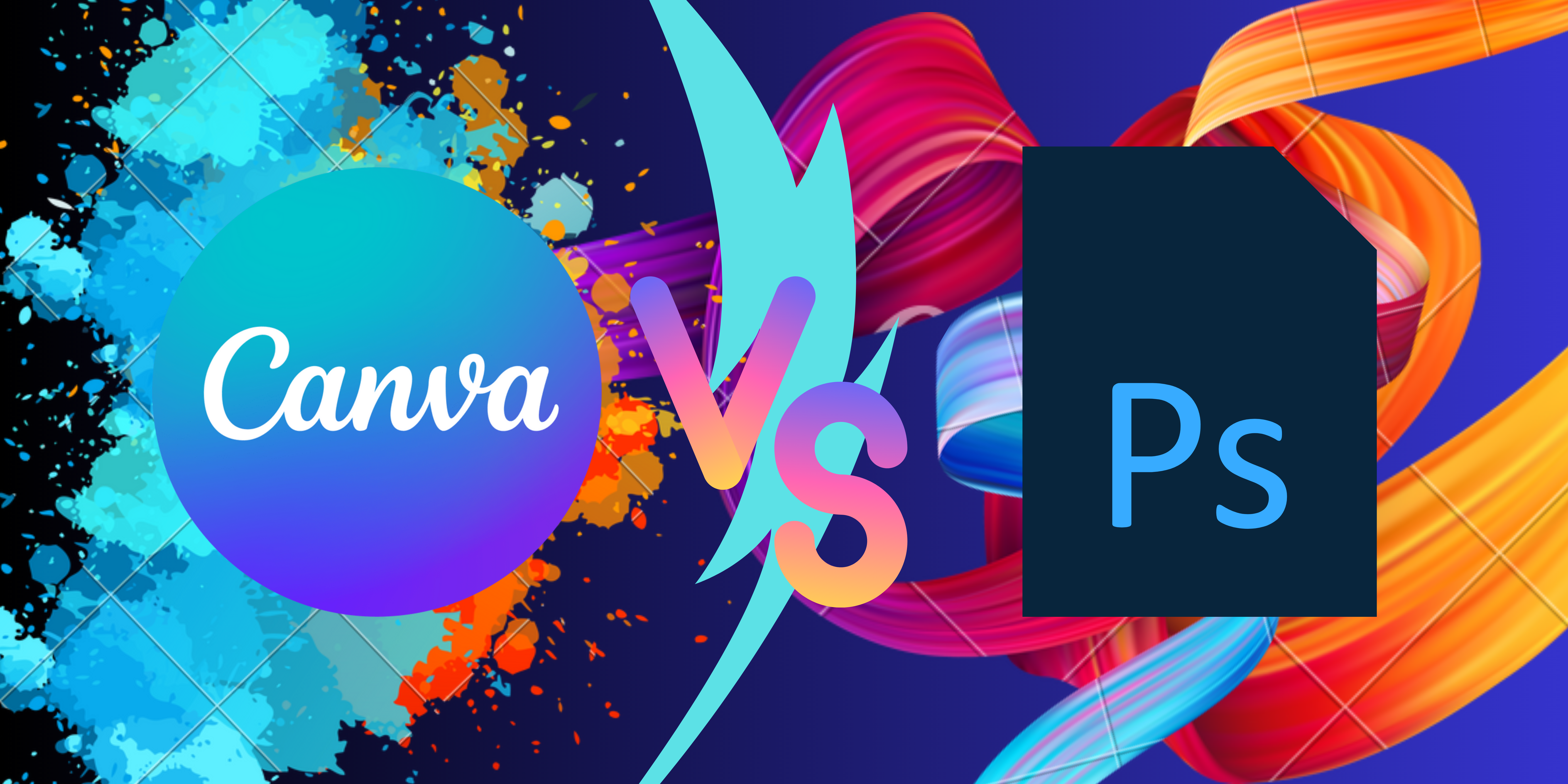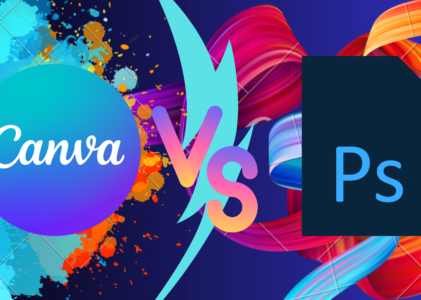In the world of graphic design, Canva and Photoshop are two of the most popular tools available. While both serve similar purposes, they cater to different needs and skill levels. This detailed comparison will help you understand which tool might be better suited to your requirements, whether you’re looking for a free solution or a more advanced, paid option.

Overview of Canva and Photoshop
Canva is a web-based design tool known for its user-friendly interface and simplicity. It is ideal for creating visually appealing graphics quickly, without the need for advanced design skills. Canva offers a range of templates and drag-and-drop functionality, making it accessible to beginners and non-designers.
Photoshop, developed by Adobe, is a professional-grade software renowned for its extensive features and capabilities. It is a powerful tool for detailed graphic design, photo editing, and digital art. Photoshop is favored by professionals for its versatility and depth, though it comes with a steeper learning curve.
Ease of Use
Canva stands out for its ease of use. The interface is intuitive, and users can create designs effortlessly using pre-designed templates. For instance, you can drag and drop elements, change text, and adjust colors with minimal effort. This simplicity is why Canva is often recommended for social media graphics, presentations, and marketing materials.
On the other hand, Photoshop’s learning curve can be daunting for beginners. The software offers a vast array of tools and features, which can be overwhelming. However, for those who invest time in learning Photoshop, the payoff is significant. Advanced users can achieve a high level of detail and customization that Canva cannot match.
Features and Functionality
Canva Features:
- Templates: Canva provides a wide range of templates for various purposes, including social media posts, presentations, and posters. These templates simplify the design process, allowing users to create polished designs quickly.
- Drag-and-Drop Editor: The drag-and-drop functionality allows users to easily move and resize elements within their design. This feature is perfect for those who want to make quick adjustments.
- Collaboration Tools: Canva offers real-time collaboration features, making it easy for teams to work together on design projects. Users can share their designs and get feedback instantly.
Photoshop Features:
- Advanced Editing Tools: Photoshop is equipped with advanced tools for photo manipulation, including layer masks, filters, and adjustment layers. These tools provide a high degree of control over the editing process.
- Text and Typography: Photoshop excels in typography, offering extensive options for text styling and effects. Designers can create intricate text designs with precision.
- Custom Brushes and Filters: Users can create and use custom brushes and filters, which allows for unique and personalized design elements.
Pricing
Canva Pricing:
- Free Plan: Canva’s free plan includes a range of basic features and templates. While it is functional for most users, it comes with some limitations, such as fewer template options and fewer design elements.
- Pro Plan: Canva’s Pro plan costs approximately $49 per year. This plan offers additional features, including access to premium templates, a larger library of images, and the ability to work offline.
Photoshop Pricing:
- Subscription Plan: Photoshop is available through Adobe’s Creative Cloud subscription service. The standard plan costs about $20.99 per month, which includes Photoshop along with other Adobe apps.
- Creative Cloud All Apps Plan: For those who want access to the entire suite of Adobe Creative Cloud applications, the All Apps plan is available for approximately $54.99 per month. This plan is ideal for professionals who require multiple design and editing tools.
Performance and Versatility
Canva Performance:
Canva performs well for straightforward design tasks and is highly responsive. Its web-based nature allows for quick access from any device with an internet connection. However, because it is a cloud-based tool, its performance can be dependent on internet speed.
Photoshop Performance:
Photoshop is a powerful tool that performs exceptionally well for complex design and editing tasks. It requires a more robust computer system and may have a higher resource demand compared to Canva. Photoshop’s performance is consistent, especially for high-resolution projects and detailed work.
Suitability for Different Users
Canva:
Canva is best suited for individuals and businesses looking for a straightforward and cost-effective design tool. Its ease of use makes it ideal for creating quick graphics, marketing materials, and social media content without needing extensive design skills.
Photoshop:
Photoshop is tailored for professional designers and those who need advanced editing capabilities. Its extensive features and tools make it suitable for high-end photo editing, intricate designs, and artistic projects.
Summary
Choosing between Canva and Photoshop depends on your specific needs and level of expertise. Canva is a fantastic option for those who need an easy-to-use, budget-friendly design tool for everyday graphics.
It is particularly useful for non-designers who want to create visually appealing content quickly. Conversely, Photoshop is the go-to choice for professionals who require advanced features and have the skill set to leverage its full potential.
Ultimately, both tools have their strengths and weaknesses. If you’re looking for a free, user-friendly solution with basic features, Canva is a great choice. If you’re willing to invest in a paid tool for more advanced capabilities and extensive design options, Photoshop is the superior option.
Discover more from lounge coder
Subscribe to get the latest posts sent to your email.

